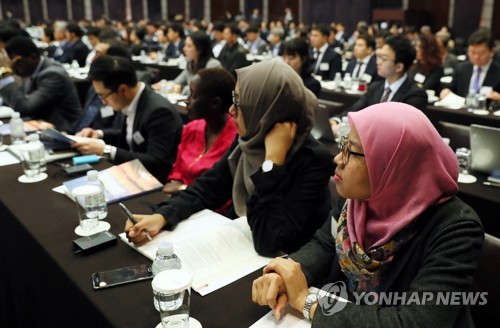- California Assembly OKs highest minimum wage in nation
- S. Korea unveils first graphic cigarette warnings
- US joins with South Korea, Japan in bid to deter North Korea
- LPGA golfer Chun In-gee finally back in action
- S. Korea won’t be top seed in final World Cup qualification round
- US men’s soccer misses 2nd straight Olympics
- US back on track in qualifying with 4-0 win over Guatemala
- High-intensity workout injuries spawn cottage industry
- CDC expands range of Zika mosquitoes into parts of Northeast
- Who knew? ‘The Walking Dead’ is helping families connect
Transit fees for trans-Korea gas pipeline estimated at over 200 bln won: KOGAS
SEOUL, Oct. 23 (Yonhap) — South Korea may have to pay around 200 billion won (US$175.9 million) annually for transit fees to North Korea if it imports Russian natural gas via a trans-Korea pipeline, an estimate by the state-run gas firm showed Tuesday.
The Korea Gas Corp. (KOGAS) calculated the transit fees at the request of Rep. Kwak Dae-hoon of the Liberty Korea Party, as the long-sought-after project has reappeared amid a mood of rapprochement on the Korean Peninsula.
KOGAS and Russian gas giant Gazprom have resumed joint studies on a tripartite gas pipeline as President Moon Jae-in has actively pursued an engagement policy with North Korea.
The gas company estimated the annual transit fee for North Korea at 180.4 billion won under a premise of paying $2 for pumping 1,000 cubic meters of liquefied natural gas (LNG) every 100 kilometers. The calculation was based on Gazprom’s comparable contracts with Ukraine, Belarus and Slovakia under a volume rated system.
The cost could rise to up to 222.1 billion won if South Korea pays 5 percent fees on gas equal to 7.5 million tons from Russia’s Far East to South Korea via North Korea for a period of 30 years.
KOGAS said it is hard to estimate the exact amount of transit fees as it needs to conduct a geological survey before building the infrastructure and calculate natural gas demand in North Korea.
“Once international sanctions on North Korea are lifted in the future, we will decide whether to push for the trans-Korea natural gas pipeline project after reviewing its feasibility, stability of gas supply and diplomatic and security issues,” KOGAS said in the report.
South Korea, the world’s third-largest buyer of natural gas, has sought to stably bring in fuel at cheaper costs for the past 20 years, but such efforts have not materialized due in part to security tensions on the peninsula.
The project is now part of Seoul’s “New Northern Policy,” which is aimed at expanding economic cooperation with Russia in energy, transportation and various other areas.












